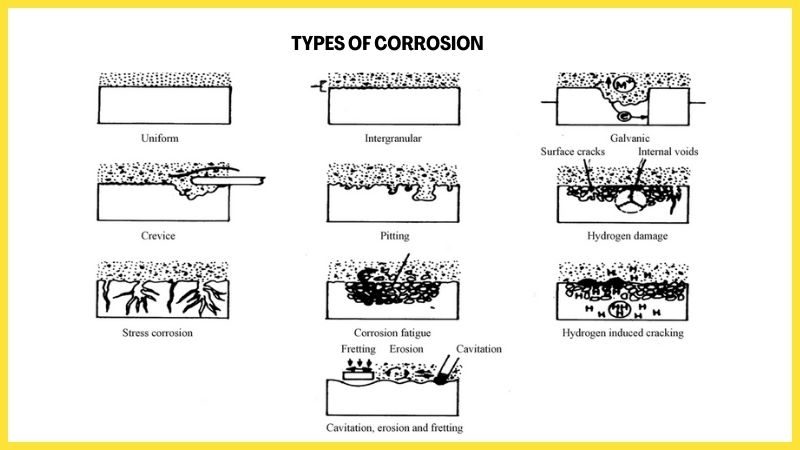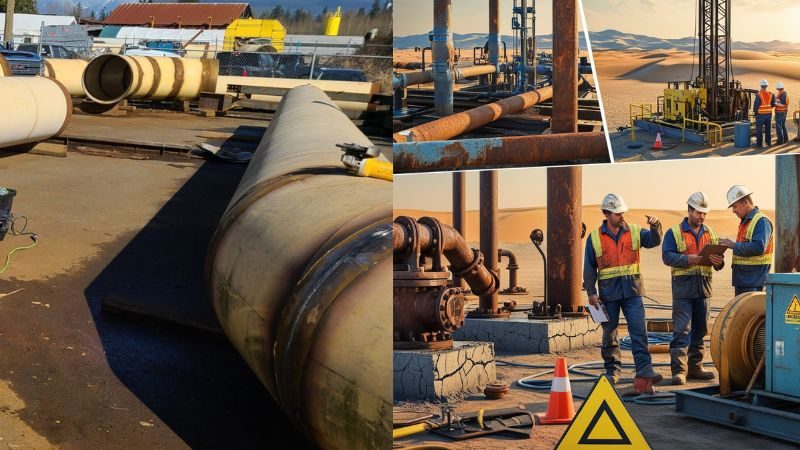Imagine a world where bridges crumble, ships rust away, and buildings deteriorate rapidly. Now, picture the opposite – structures that stand the test of time, resisting corrosion and wear for decades. The difference? Proper coating inspection. In this comprehensive guide, we’ll dive deep into the world of coating inspection methods, exploring why they’re crucial, how they’re performed, and the cutting-edge techniques that are shaping the future of protective coatings.
The Hidden Heroes of Infrastructure
Every day, we’re surrounded by coated surfaces – from the paint on our walls to the protective layers on massive oil tankers. But have you ever stopped to consider the meticulous process that ensures these coatings do their job? That’s where coating inspection comes in, and that’s where you could play a vital role with the right training.
Coating inspection is the unsung hero of countless industries, playing a pivotal role in preserving assets worth billions of dollars. From preventing corrosion in marine environments to ensuring the longevity of industrial equipment, proper coating inspection is the key to extending the life of valuable infrastructure and equipment.
In this article, we’ll explore the fascinating world of coating inspection methods, revealing:
- Why coating inspection is critical for various industries
- The essential tools and techniques used by coating inspectors
- How to overcome common challenges in the field
- The exciting future of coating inspection technology
- How you can kickstart your career with BGAS Inspector Training at IMECH Institute in Hyderabad
Whether you’re a seasoned professional looking to upgrade your skills or someone considering a career change, this guide will provide valuable insights into the art and science of coating inspection.
Understanding Coating Inspection: The First Line of Defense
What Is a Coating Inspection?
Coating inspection is a systematic process of evaluating and documenting the application of protective coatings to ensure they meet specified standards and will perform as intended. It’s not just about checking if the paint looks good – it’s a critical quality control measure that can make the difference between a structure lasting for decades or failing prematurely.
The importance of coating inspection spans various sectors:
Industrial: Protecting equipment from corrosion and chemical damage
Marine: Safeguarding ships and offshore structures from harsh saltwater environments
Construction: Ensuring buildings and bridges withstand weathering and environmental stresses
The Role of a Coating Inspector: More Than Meets the Eye
Coating inspectors are the guardians of quality in the world of protective coatings. Their responsibilities include:
- Verifying surface preparation meets standards
- Monitoring environmental conditions during application
- Ensuring proper mixing and application of coatings
- Measuring coating thickness and detecting flaws
- Documenting the entire process for quality assurance
To become a BGAS certified coating inspector, professionals often undergo rigorous training and certification processes, such as those offered by NACE International or SSPC (The Society for Protective Coatings).
Fundamental Concepts in Coating Inspection: The Building Blocks of Protection

Source : https://surfaceprotech.com/type-of-corrosion/
Corrosion: The Enemy of Coatings
Understanding corrosion is crucial for effective coating inspection. Corrosion can take many forms:
- Uniform corrosion: Even degradation across a surface
- Galvanic corrosion: Occurs between dissimilar metals
- Crevice corrosion: Localized in gaps or crevices
- Pitting corrosion: Deep, localized holes in the material
The impact of corrosion on structures and equipment can be devastating, leading to structural failure, equipment breakdown, and significant economic losses.
Surface Preparation: The Foundation of Successful Coating
Proper surface preparation is the cornerstone of effective coating. Coating inspection procedures must include thorough evaluation of surface preparation, which involves:
- Adherence to surface preparation standards (SP1 to SP15)
- Identification and removal of common surface contaminants like rust, oil, and mill scale
- Use of photographic inspection standards for visual comparison
Essential Tools for Coating Inspection: The Inspector's Arsenal

1. Digital Psychrometer: Mastering the Environment
A digital psychrometer is crucial for measuring atmospheric conditions such as relative humidity, temperature, and dew point. These factors significantly impact coating application and curing.
2. Surface and Digital Thermometers: The Temperature Detectives
Accurate surface temperature measurement is vital for proper coating adherence. Inspectors use various thermometers to ensure optimal conditions for coating application.
3. Surface Profile Measurement Tools: The Texture Analysts
Surface profile plays a crucial role in coating adhesion. Tools like the micrometer dial with Testex replica tape and surface profile gauges help inspectors ensure the right profile for maximum coating performance.
4. Coating Thickness Gauges: Measuring the Invisible
Wet film thickness (WFT) and dry film thickness (DFT) gauges are essential for ensuring proper coating application. Understanding the relationship between WFT and DFT is crucial for predicting final coating thickness.
5. Holiday Detectors: Finding the Flaws
Low-voltage and high-voltage holiday detectors are used to find tiny holes or thin spots in the coating that could lead to premature failure.
6. Telescopic Inspection Mirror: Reaching the Unreachable
For inspecting hard-to-reach areas, a telescopic inspection mirror is invaluable, ensuring no area is left unchecked.
7. Documentation Tools: Capturing the Evidence
High-quality cameras and documentation software are essential for recording and reporting inspection findings.
The Coating Inspection Process: A Step-by-Step Journey

Pre-Inspection Preparation: Setting the Stage
Before any coating work begins, inspectors must:
- Review project specifications and relevant standards
- Calibrate and check all inspection equipment
- Ensure all necessary safety protocols are in place
Surface Preparation Inspection: Laying the Groundwork
This critical phase includes:
- Checking abrasive materials for contaminants
- Inspecting blasting equipment for proper functionality
- Assessing surface cleanliness and profile using painting inspection methods
Coating Application Inspection: The Main Event
During the coating application, inspectors focus on:
- Monitoring environmental conditions
- Overseeing proper mixing and thinning procedures
- Evaluating application techniques for even coverage
Post-Application Inspection: The Final Verdict
After the coating is applied, inspectors perform:
- Dry film thickness measurements
- Adhesion testing to ensure proper bonding
- Holiday detection to find any discontinuities in the coating
Specialized Coating Inspections: Tailored Approaches
Concrete Coating Inspection: Mastering a Porous Challenge
Inspecting coatings on concrete requires specific considerations:
- Evaluating surface preparation techniques for concrete
- Assessing moisture content before coating application
- Performing specialized adhesion tests for concrete coatings
Pipeline Coating Inspection: Protecting the Lifelines
Pipeline coatings face unique challenges:
- Addressing cathodic protection interactions
- Performing specialized holiday detection for pipeline coatings
- Evaluating coatings for resistance to soil stresses
Best Practices for Effective Coating Inspection: Raising the Bar
Clear Inspection Scope and Planning: The Roadmap to Success
Developing comprehensive inspection plans and setting clear acceptance criteria are crucial for successful coating projects.
Effective Communication: Bridging the Gap
Coordinating with stakeholders and maintaining clear, detailed documentation are essential aspects of the coating inspector’s role.
Leveraging Technology: Embracing the Digital Age
Utilizing digital inspection tools and advanced data management software can significantly enhance the efficiency and accuracy of coating inspections.
Continuous Education and Training: Staying Ahead of the Curve
The field of coating inspection is constantly evolving. Staying updated with industry standards and participating in ongoing professional development is crucial for coating inspectors.
Challenges in Coating Inspection and How to Overcome Them: Navigating the Obstacles
Environmental Factors: Battling the Elements
Dealing with extreme temperatures, humidity, and adverse weather conditions requires careful planning and specialized equipment.
Accessibility Issues: Reaching the Unreachable
Inspecting complex structures and confined spaces often necessitates innovative approaches and specialized tools.
Quality Control in Large-Scale Projects: Maintaining Consistency
Managing consistency across multiple inspectors and implementing robust quality assurance programs are key challenges in large-scale coating projects.
Future Trends in Coating Inspection: The Road Ahead
Artificial Intelligence and Machine Learning: The Smart Inspector
- The future of coating inspection may include:
- Automated defect detection using AI-powered image analysis
- Predictive maintenance strategies based on coating performance data
Nanotechnology in Coatings: The Microscopic Revolution
As nanotechnology advances in coating formulations, inspection methods will need to adapt to evaluate these new materials effectively.
Conclusion: The Lasting Impact of Coating Inspection
As we’ve explored in this comprehensive guide, coating inspection is a critical process that ensures the longevity and performance of countless structures and equipment across various industries. From the fundamental concepts of corrosion and surface preparation to the cutting-edge technologies shaping the future of the field, coating inspection methods play a vital role in protecting our infrastructure and assets.
By understanding the importance of proper coating inspection, utilizing the right tools and techniques, and staying abreast of industry advancements, we can continue to push the boundaries of what’s possible in protective coatings. Whether you’re a seasoned inspector, a project manager, or simply curious about the science behind long-lasting structures, the world of coating inspection offers a fascinating glimpse into the intersection of chemistry, engineering, and quality control.
Remember, the next time you cross a bridge, board a ship, or enter a building, take a moment to appreciate the invisible layer of protection that coating inspectors help ensure. Their meticulous work is what keeps our world standing strong, year after year.
Launch Your Coating Inspection Career with IMECH Institute
Now that you understand the critical importance of coating inspection and the exciting opportunities in this field, are you ready to take the next step in your career? IMECH Institute in Hyderabad offers comprehensive BGAS Inspector Training that can set you on the path to success.
Why Choose BGAS Inspector Training at IMECH Institute?
- Industry-Recognized Certification: Our BGAS Inspector Training program is globally recognized, giving you a competitive edge in the job market.
- Hands-On Experience: Gain practical skills with our state-of-the-art equipment and real-world simulations.
- Expert Instructors: Learn from experienced professionals who bring years of industry expertise to the classroom.
- Comprehensive Curriculum: Our program covers all aspects of coating inspection, from basic concepts to advanced techniques.
- Career Support: Benefit from our job placement assistance and industry connections.
- Flexible Learning Options: Choose from full-time, part-time, and online courses to fit your schedule.
Don’t miss this opportunity to become a certified BGAS Inspector and open doors to exciting career prospects in industries worldwide. Join us at IMECH Institute in Hyderabad and take the first step towards a rewarding career in coating inspection.
Ready to get started? Contact us today to learn more about our BGAS Inspector Training program and how it can transform your career. Call 9700008797 to enroll now. Your future in coating inspection starts here!





